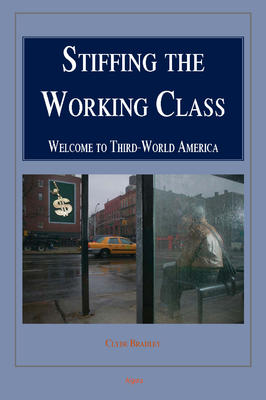
Sound Bite
This book takes the reader on a journey that spans over three decades of manufacturing trends on a very personal level as seen through the eyes of a typical blue collar factory worker. Cutting corners and cutting wages may goose the bottom line briefly, but over the long term they destroy employees' ability to get the job done. Anecdotes from the contemporary American manufacturing world expose management's utter disrespect for workers, from unsafe and unsanitary work conditions to low pay, lack of job security, and the use of illegal immigrants.
About the Author
Clyde Bradley has 27 years of manufacturing experience, including 22 years in powdered and liquid food processing, 3 years in cable and wire harness manufacturing and 2 years in poultry processing. He has also worked in hotel maintenance, slot machine repair and as a Field Service Rep servicing and maintaining Bio-hazard detection equipment. Clyde had been a freelance writer since 1997, with assignment ranging from an entertainment column to sports coverage, editorial, and celebrity interviews for newspapers in Indiana and South Carolina.
|
|
About the Book
The writer shows how paying a little more money for permanent employees results in increased production and improved quality, whereas using cheaper temporary labor destroys quality. He shows that the middle class wage base is depressed not only by...
The writer shows how paying a little more money for permanent employees results in increased production and improved quality, whereas using cheaper temporary labor destroys quality. He shows that the middle class wage base is depressed not only by the use of illegal immigrants but also by retired employees reentering the work force at reduced wages, and provides illustrations of unsafe working conditions caused by improper training as well as faulty equipment. Overly-aggressive management styles deter employees from wanting to do a good job, and unique problems are created when an employer throws two different groups of people together and expects them to work effectively when they speak different languages and cannot communicate. The book is written largely in a narrative style, serious where necessary but also lighthearted and humorous when appropriate. This book offers a breath of fresh air to those who struggle to survive or even do a good job in today's work environment; it also offers a useful perspective to managers.
|
I found myself dreading getting out of bed in the morning. I was working in America, yet somehow it seemed like I was magically transported on a daily basis to some third-world nation where OSHA standards and labor laws didn't exist. I felt trapped in a manufacturing environment that was slowly sucking the lifeblood right out of me. I hated...
I found myself dreading getting out of bed in the morning. I was working in America, yet somehow it seemed like I was magically transported on a daily basis to some third-world nation where OSHA standards and labor laws didn't exist. I felt trapped in a manufacturing environment that was slowly sucking the lifeblood right out of me. I hated manufacturing and I wanted out.
But it wasn't always that way. There was a time when I was actually proud to be a career American factory worker. Eventually our large corporation was taken over by an even larger corporation. The sixth week of vacation offered to the 30-year veterans, of which we had more than the average company, was abolished to match the other company's five-week vacation maximum. Excess capacity was evaluated at all plants. Product lines were then shifted from one plant to another, paving the way to start closing plants. Our '¦ new plant manager '¦ quickly unveiled a plan to reduce workforce wages...
The major flaw with this plan was that it applied to the hourly workforce only. The higher paid salaried management staff was not asked to participate'¦; this set up a 'them' against 'us' attitude between the hourly work force and management. I had never experienced that before'¦
|
Reference & Research Book News | More »
Reference & Research Book News
A wide-ranging freelance writer since 1997, Bradley takes readers on a tour of his previous 27 years as a blue-collar worker in the US, mostly in manufacturing but also poultry processing. Among his perspectives are everyone wants to play on a winning team, all factories are not created equal, making ends meet, OSHA: "obvious safety hazards accepted," and where we go from here.
|
|
Pages 188
Year: 2012
BISAC: BUS038000
BISAC: BUS041000
Soft Cover
ISBN: 978-0-87586-900-1
Price: USD 21.95
Hard Cover
ISBN: 978-0-87586-901-8
Price: USD 31.95
eBook
ISBN: 978-0-87586-902-5
Price: USD 21.95
|













